Brian Clegg's Blog, page 2
September 1, 2025
Revisiting a Bacon hunt
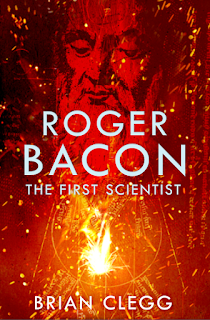 REVISIT SERIES - An updated post from September 2015
REVISIT SERIES - An updated post from September 2015Roger Bacon is a misty figure in the history of science. Over the years, this thirteenth century friar has been portrayed as a mystic, magician, scientist ahead of his time and second rate collector of other people's ideas. It doesn't help that he often gets confused with his unrelated (as far as we are aware) Elizabethan namesake Francis Bacon. But it is in part because of the messy way that Roger has been reported over the years (even starring in a play by one of Shakespeare's contemporaries) that he is a fascinating subject.
My book on Bacon and his science has an intentionally provocative subtitle. I ought to make it clear that in many ways he clearly wasn't the first scientist. Apart from the impossibility of coming up with a 'first' and the argument that you couldn't have a scientist before the word was coined (a terrible argument to my mind - you might as well say there weren't dinosaurs before the word was coined), Bacon was pretty bad on most of the requirements to call someone a scientist. But he did try most of them. He emphasised the essential contribution of maths long before it was fashionable (Francis wasn't impressed with maths, for instance), Roger went on at great length about the importance of experiment, rather than relying on received wisdom, he risked his life to communicate science and he was a scourge of those who claimed to be magicians (ironic, given that he would later be regarded as one himself). Bacon was pretty bad on scientific matters, but the reason I do give him this tongue-in-cheek label is that I would expect an early person to fit a label to be bad at the role. By the time you get to Galileo and Newton they were far too polished.
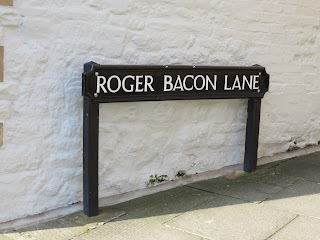
But the point of this post isn't to put the case for Bacon, which was never intended to be taken too seriously. Instead it's a chance to share some photos of an attempt to track down Bacon in his main academic home, Oxford. He was in Oxford when the university was just beginning, both as a member of the university and of the Franciscan friary there. I did find a few traces of Bacon - but you might think there'd be a little more.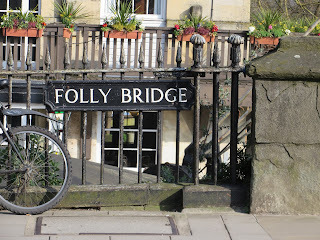 Admittedly he gets a lane, suitably small and near the sprawling location of the Franciscan friary, mostly now brutalist overpasses and uninspiring modern buildings. According to legend, at some point he had a study in the building that spanned Folly Bridge on the southern approach to the city. The building certainly existed, though there was no reason to link it to Bacon.
Admittedly he gets a lane, suitably small and near the sprawling location of the Franciscan friary, mostly now brutalist overpasses and uninspiring modern buildings. According to legend, at some point he had a study in the building that spanned Folly Bridge on the southern approach to the city. The building certainly existed, though there was no reason to link it to Bacon.
But that structure is long gone. It narrowed the bridge to a single track and was totally unsuited to modern traffic. Now the bridge is an uninspiring bit of architecture you could drive over without even realising you were on a bridge.
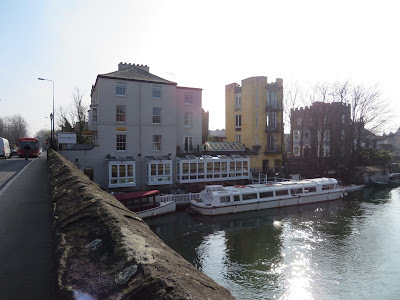
But surely Oxford could not fail to mark the presence of one of its very rare chances to eclipse Cambridge in the scientific field? There is indeed a plaque to Bacon in Latin and English, reflecting his one-time label of Doctor Mirabilis.

Unfortunately, the siting of the plaque could have been better for a good few years. It was on the side of a multi-storey car park, another of Oxford's delightful replacements for the friary:

However, the car park was demolished in rebuilding the attached shopping centre and for some time I had no idea where the plaque had got to. It has apparently re-appeared inside the new shopping centre as shown below:

Still, there is one place where it feels as if Bacon is being given his due. Oxford's gorgeous natural history museum contains a series of statues of scientific figures, and there, amongst the skeletons, is Roger in all his glory. Of course we've no idea what he looked like, but I think it's right that he should be remembered.

Photos by the author except current Bacon plaque location, by Stephanie Jenkins
These articles will always be free - but if you'd like to support my online work, consider buying a virtual coffee or taking out a membership: See all Brian's online articles or subscribe to a weekly email free hereAugust 25, 2025
Is this the best of SF? Revisited
 REVISIT SERIES - An updated post from August 2015I was interested to note a debacle started by a dated US list of top 100 science fiction and fantasy books. We'll come back to this furore over the suggestion that many of these books were 'shockingly offensive' in a moment, but first a couple of comments about the list itself.To me it seems a category error to conflate fantasy and science fiction - where most of their SF choices seemed sensible, I wouldn't have included over 50 per cent of the fantasy, which makes me suspect that there should be two separate lists.
REVISIT SERIES - An updated post from August 2015I was interested to note a debacle started by a dated US list of top 100 science fiction and fantasy books. We'll come back to this furore over the suggestion that many of these books were 'shockingly offensive' in a moment, but first a couple of comments about the list itself.To me it seems a category error to conflate fantasy and science fiction - where most of their SF choices seemed sensible, I wouldn't have included over 50 per cent of the fantasy, which makes me suspect that there should be two separate lists.If we just concentrate on the SF books, there were inevitably some ridiculous omissions. No John Wyndham, for instance (probably reflecting this being a US list). No Alfred Bester, James Blish, Fred Pohl, Cyril Kornbluth or (if you want to be more obscure) no E. F. Russell. However it wasn't a bad list overall - no one will ever agree with everything in such a collection.
So what about the moaning article in the New Statesman (pointed out to me by Niki Gamm), which berates this list? One complaint in the article is that most of the SF books are pre-1990s. I think this, to be honest, is entirely reasonable. I struggle to name more modern authors other than Banks and Stephenson who are truly great*. I do wonder if it's because a lot of the best SF is about surprising the reader with really original ideas, most of which had been played out by the 1980s.
The other complaint, the one that makes the books in the opinion of the article's author 'shockingly offensive' is that a lot of them appear sexist. I'm sorry, but to complain about this is revisionist nonsense. You can't apply the standards of the day to the past. You might as well take offence at the sexism, racism and anti-semitism in Dickens and Shakespeare. I'm afraid it shows little imagination in the reader if they can't read a book in the context of the time in which it was written.
You might as well moan that the science and technology in old science fiction is pretty well always wrong. Of course it is. And it certainly can be amusing. For instance, Blish notes that it's impossible for electronics to work near Jupiter because the gravitational pull is so strong it would crush the valves (vacuum tubes). However it would be silly to downgrade the status of a story just because it contains such an issue. It's certainly true that there are some pre-Enlightnment II books that I find it difficult to read now because science, sexism or racism issues are so badly handled - but that doesn't apply to many in that top 100 list on the SF side (I can't comment on the fantasy).
I think it's great that we don't have the same problems with sexism, racism etc. in modern writing as used to be the case. But to arbitrarily dismiss something written before attitudes changed simply because it fits with the values of the present seems a patently naive view.
* My list of good modern authors has been expanded significantly since 2015 as I've got back to reading more SF. But when I think of the top flight modern SF writers, many have only come to prominence since 2015.
These articles will always be free - but if you'd like to support my online work, consider buying a virtual coffee or taking out a membership: See all Brian's online articles or subscribe to a weekly email free here
August 18, 2025
Graphics are great - but don't let them obscure the message
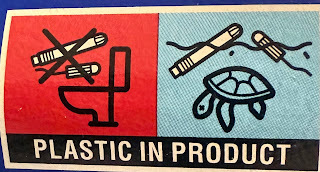 As a writer I have (unsurprisingly) something of a bias towards the written word. I hate getting information from videos because they are so slow at putting stuff across - when I've had to do an online course with videos, I always use the transcript instead if available and get through it in half the time. I'm just not very visually oriented. But that said, I can of course see the benefit of graphics as a way of putting across a piece of information where words can be clumsy.
As a writer I have (unsurprisingly) something of a bias towards the written word. I hate getting information from videos because they are so slow at putting stuff across - when I've had to do an online course with videos, I always use the transcript instead if available and get through it in half the time. I'm just not very visually oriented. But that said, I can of course see the benefit of graphics as a way of putting across a piece of information where words can be clumsy.When I help students and academics with their papers I always ask them to ensure that a figure, or diagram or chart adds something to the text. They should never be there simply because they feel they need one. However, when it comes to packaging it seems that graphic designers sometimes rule the roost and the result can be a mangling of the message.
Take the graphic above. We've got two boxes - one red with a slash through it. That's obviously the 'don't do this' box. And the other is blue with no slash through - obviously the 'do this instead box'. It's a visual convention. Don't flush this down the toilet, throw it into the sea instead.
Only that's not what it means at all. The right hand box is intended to put across 'if you do what's in the red box, this is what will happen.' Because there are no words, we're in a mess, potentially confused by the visual messaging. I can see packaging design is a visual activity - but designers need to bear in mind how important words are too.
These articles will always be free - but if you'd like to support my online work, consider buying a virtual coffee or taking out a membership: See all Brian's online articles or subscribe to a weekly email free hereAugust 11, 2025
AI turns to mind reading
 When researching my book
Brainjacking
on the science of human use of story to inform, influence and manipulate, I came across an intriguing article in The Times. 'AI will read your mind sooner than you think' blared the headline on Rhys Blakely's piece. He describes the interpretation of signals from electrodes in the brain, processed by AI to help a disabled person be more independent, which is fascinating. But we are then told 'But what about the rest of us? Would you allow a computer direct access to your thoughts? The question isn't as far fetched as it once was.'
When researching my book
Brainjacking
on the science of human use of story to inform, influence and manipulate, I came across an intriguing article in The Times. 'AI will read your mind sooner than you think' blared the headline on Rhys Blakely's piece. He describes the interpretation of signals from electrodes in the brain, processed by AI to help a disabled person be more independent, which is fascinating. But we are then told 'But what about the rest of us? Would you allow a computer direct access to your thoughts? The question isn't as far fetched as it once was.'Hype or accurate observation?
Blakely describes an experiment at UC Berkeley where subjects were played music - with the help of AI it was possible for listeners to identify the music from processed brain signals, and even pick out some of the words.
I looked into the detail of this experiment for the book. Firstly, given that introduction, you might think this involved detecting your brain activity using some sort of cap, or even remotely. In reality, the experiment relied on electrodes being inserted into the brain. This isn't something I can imagine anyone doing voluntarily unless it was for a medical intervention (and unsurprisingly, here the electrodes were already there for medical reasons - they weren't inserted to do the experiment).
As an aside, when interviewing Mark Gomes, whose novel Age of Extinction featured workers being fitted with chips in their brains, I asked if he really thought it would be come commonplace for people to have surgically implanted chips for non-medical reasons. He replied 'Yes. Not because people want it—but because some will feel they have no choice. In wealthier countries, it’ll be sold as a lifestyle enhancement: faster cognition, seamless access, performance gains. But in poorer parts of the world, it’ll be about survival. If someone offered you a neural chip and, in return, your family could eat for six months—what would you say? That’s not science fiction. That’s economic reality.'
I'm still not convinced - this is arguably a lot worse than selling a kidney, say, for money.
Back with the real life mind-reading experiment, I was able to access the original paper and from that the audio files produced from brain signals. Here's a challenge for you. This clip is supposed to enable you to recognise the piece of music. And this clip apparently makes it possible to distinguish some of the lyrics.
In all honesty, I have not been able to do either, even though I know what's the answers should be. In giving talks on Brainjacking, I've played the clips to my audiences... and no one has ever succeeded in identifying either the song or the words. (If you want to see how you did, scroll down to the bottom of the page for the correct answers.)
I am not suggesting the experimenters were in any way fraudulent, but is it really possible that they have got this right when hundreds of people have failed to come to an answer? I might not be reproducing the experiment under the lab conditions, but I think playing the clips as part of a talk, is a reasonable failed attempt to reproduce the result.
Arguably, the problem, as far as I can tell from the paper (and please don't access it yet if you intend to try the experiment as the song is identified early on), is that the experimenters did not ask even a small number of people, let alone a large sample, to perform the recognition test. Instead their recognition analysis appears to have been based on spectrographic similarities. (Apologies if I missed an actual test with people, but there is far more information on the original sources and processing than on the testing.)
Equally, it's hard not to take the way that the experiment was portrayed in the newspaper as hype. Blakely was just as capable as I was of trying out the actual sound files and seeing if the results made any sense - but there is no suggestion in his piece that there was a problem with this. I will, though, agree firmly with the last sentence of his article. 'And don't let anybody drill a hole in your head.' Certainly for non-medical reasons.
Image by Alex Shuper from Unsplash+
These articles will always be free - but if you'd like to support my online work, consider buying a virtual coffee or taking out a membership: See all Brian's online articles or subscribe to a weekly email free here What was it all about?Scroll down...vvvvvvvvFurther...vvvvvvvNearly there...vvvvvvv
The music was Pink Floyd's Another Brick in the Wall, Part 1 - included below for those not familiar with it - and the alleged recovered partial vocals were 'all', 'was' and 'just a brick'.
August 9, 2025
Appealing to Authority revisited
 REVISIT SERIES - An updated post from August 2015Recently I was berated on Facebook for appealing to authority. As it may not be obvious to everyone why this was a put down (as the picture makes clear it was), I thought it might be worth looking at the problem with authority in science - and why I wasn't actually falling for this failing.Arguably the biggest issue with Ancient Greek science, an approach that spread its way through most of the medieval period, was the dependence on authority. Just as we still do in law cases, most classical natural philosophy was decided by argument rather than by experiment or analysis. If someone repeatedly won the argument on a topic they were regarded as an authority and in some cases - Aristotle is the most obvious example - considered a source of wisdom on pretty well everything as a result. Hence the infamous suggestion that women had fewer teeth than men because Aristotle said it was so, and no one bothered to check. (Actually I am sure plenty did check and found it to be wrong, but because they weren't Aristotle, they were ignored.)
REVISIT SERIES - An updated post from August 2015Recently I was berated on Facebook for appealing to authority. As it may not be obvious to everyone why this was a put down (as the picture makes clear it was), I thought it might be worth looking at the problem with authority in science - and why I wasn't actually falling for this failing.Arguably the biggest issue with Ancient Greek science, an approach that spread its way through most of the medieval period, was the dependence on authority. Just as we still do in law cases, most classical natural philosophy was decided by argument rather than by experiment or analysis. If someone repeatedly won the argument on a topic they were regarded as an authority and in some cases - Aristotle is the most obvious example - considered a source of wisdom on pretty well everything as a result. Hence the infamous suggestion that women had fewer teeth than men because Aristotle said it was so, and no one bothered to check. (Actually I am sure plenty did check and found it to be wrong, but because they weren't Aristotle, they were ignored.)This reverence for the word of Aristotle was shattered in science itself by the likes of Galileo and Newton, and thereafter it should not be good enough just to be an authority figure to be assumed correct on any topic. But it tends to still happen outside of science. A good example today of when we make a mistaken appeal to authority is when, for instance, we think that a Nobel Prize winning scientist has more weight outside their specialist field than do other people. There is no reason, for instance, to give weight to Linus Pauling's beliefs on the medical benefits of vitamin C, because it wasn't his area of expertise - but still people do.
However, this is quite different from preferring people with expertise as sources within their subject of expertise to a random person on the street. That is not an appeal to authority, it is just common sense. I'm not a scientist, I'm a writer with a very rusty physics degree, and a very slightly less rusty operational research masters. As such, I would never dream of putting forward my own theories in science. But if I want to describe a physical theory or idea, I will give more weight to the word of a well-established physicist than I would to the next person who sends me their new physics theory by email.
I get sent quite a lot of these off-the-wall physics theories. I would not use those in one of my books, except to raise an eyebrow at it. Instead I put across ideas coming from well-established physicists (if I'm writing about physics - not if I'm writing about psychology). This is not an appeal to authority, it's the only sensible thing to do as I can't possibly test out or check their theories myself. However, if I used Richard Feynman's viewpoint to provide expertise on music or Niels Bohr on literature, then I would indeed be incorrectly appealing to authority. Which would be wrong (as anyone who knows what Feynman's taste in music was would probably agree).
In the case that started this piece off, I had referenced another famous physicist George Gamow on a physics matter, so this was not the case. It's easily done, but we shouldn't confuse a flag that we are accessing expertise with an appeal to authority.
These articles will always be free - but if you'd like to support my online work, consider buying a virtual coffee or taking out a membership: See all Brian's online articles or subscribe to a weekly email free here
August 5, 2025
Tesla and the Magic Roundabout
 No, not the Magic Roundabout that was a teatime treat on TV many years ago. And not Nikola Tesla either. We are taking about the US electric car company and one of the best-known features of my home town Swindon - our Magic Roundabout.
No, not the Magic Roundabout that was a teatime treat on TV many years ago. And not Nikola Tesla either. We are taking about the US electric car company and one of the best-known features of my home town Swindon - our Magic Roundabout.The reason for this post is that Tesla has been doing some testing of fully self-driving cars in the UK, and a test site they have publicised is getting across the Magic Roundabout. We inhabitants of Swindon are rather proud of our ability to fearlessly cross the Magic Roundabout, but it certainly puts an aspect of nervousness into many who encounter it for the first time.
 What can be scary about a roundabout? Because it isn't really that at all - it is five mini-roundabouts joined together by very short sections of roadway.
What can be scary about a roundabout? Because it isn't really that at all - it is five mini-roundabouts joined together by very short sections of roadway.The diagram alongside shows the layout of the roundabout, and two possible routes for getting from the bottom left road to the right hand one. This is what makes it so much fun. You can go whichever way you like around the whole structure as long as you stick to proper roundabout protocol on the mini-roundabouts. There is never just one way to get from A to B.
However, the diagram also demonstrates that to a logic-following computer, there really is no complexity to navigating the Magic Roundabout. At each point there are clear options - and it doesn't really matter if you choose a non-optimal route. You will still end up where you want to go.
For me this is a classic example of showing how an autonomous vehicle can cope better with things humans are bad at. We struggle initially with getting our heads around the Magic Roundabout as a single system, rather than simply heading towards where you want to go, considering each mini-roundabout in its own right. But computers have always been better at some things than humans. Just because Excel is a lot better than me at adding up a column of numbers doesn't mean it can write books better than me.
A real test for a Tesla in fully automated mode, or any other self-driving car, is things that people are good at, but provide a challenge to computers. A far better test as far as UK driving goes, would be navigating the country roads just a couple of miles from the roundabout. These involve tight turns, around which you might meet a sheep or a bicyclist, requirements to give way where visibility is not great, potholes to avoid and potential debris in the road from tree branches to horse muck. (Oh, yes, and knowing how to pass a horse and rider travelling in the opposite direction.) If a Tesla could do all of that, I'd be impressed. But the Magic Roundabout? Pah.
Here's the Tesla in action - of course it looks impressive, but we are looking at it through human eyes:
Tesla image from Unsplash+ by Tesla Fans Schweiz. Magic roundabout image from Wikipedia by Hk kng, cmglee
These articles will always be free - but if you'd like to support my online work, consider buying a virtual coffee or taking out a membership: See all Brian's online articles or subscribe to a weekly email free here
August 4, 2025
Stone and Sky - Ben Aaronovitch ***
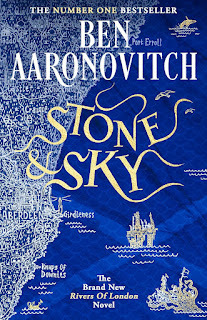 I am somewhat amazed that, despite having read all 10 main novels in the series, this is the first of Ben Aaronovitch's Rivers of London series that I've reviewed. It might seem odd that a book in a series with that title is set in and around Aberdeen, but you need to realise that the 'rivers' in question are genii loci - spirits of a river, one of whom is present.
I am somewhat amazed that, despite having read all 10 main novels in the series, this is the first of Ben Aaronovitch's Rivers of London series that I've reviewed. It might seem odd that a book in a series with that title is set in and around Aberdeen, but you need to realise that the 'rivers' in question are genii loci - spirits of a river, one of whom is present.What I love about the series is that it combines police procedural (Aaronovitch delights in details like airwave radios and stab vests) with magic. In the early books, the central character, DS Peter Grant, is a newbie to the whole magic world, but ends up posted with a specialist unit dealing with magical threats (and trying to drag them into the twenty-first century). This time round, the oddities include dangerous magical beasts, kelpies and mermaids.
This is, unfortunately, probably the weakest in the series. In part this is because Aaronovitch splits the first person narrative between Grant and his niece Abigail, who is not with the police but is apprenticed to the unit's head, Nightingale. This really weakens the police procedural nature of the books, as Abigail does her own thing. Also, I find this middle-aged man's attempt to give the inner narrative of a young black woman a little queasy-making, telling us that something is 'bare vexing' or 'Nightingale says you've got to buss sleeves and ting when you're finessing the bush'.
Aaronovitch usually gives us a big scene of high risk, this time on an oil platform in the North Sea (though again, splitting the narrative with Abigail, who isn't present for the denouement, weakens the drama), but the whole context seemed less effective and more contrived than it is in most of the earlier books. And of the main characters, both Nightingale and Beverley (Grant's wife and a genius loci) feel underused, except in the 'with a single bound she was free' ending.
Reading this inspired me to restart the whole series with the original Rivers of London - and immediately I realise why I enjoyed the early novels so much: it is much better, plunging you into the action. By the end of chapter two, we've had a decapitation, a witness who is a ghost, a baby thrown out of a first floor window and a man's face falling off. Here we have a possible sighting of a magical big cat. Within days I was already on book 4 - but I felt no such urgency to carry on reading with Stone and Sky. But it's not just the action - Grant's narration is far more fun in the early books and there's a constant, driving energy that just isn't present in Stone and Sky. It's not the end of the world - even Terry Pratchett had a bit of a dip around this point of the Discworld series before getting even better. Hopefully Aaronovitch can get his mojo back too.
Stone and Sky is not a bad novel. Compared to many real-world fantasies, Aaronovitch's skill shines through: he can't help give us a readable book with occasional flashes of humour to lighten the dangerous situations. But it almost feels as if the author is trying to mix a young adult romantasy novel in Abigail's chapters and the more heavy duty matters in the Grant chapters, and it doesn't quite work. Whatever you do, read the other books first - don't start here - but if you have done so, it is still worth adding this to your Rivers of London reading.
You can buy the Stone and Sky from Amazon.co.uk, Amazon.com and Bookshop.org.
Using these links earns us commission at no cost to youThese articles will always be free - but if you'd like to support my online work, consider buying a virtual coffee or taking out a membership:Review by Brian Clegg - See all Brian's online articles or subscribe to a weekly email free hereJuly 28, 2025
What is a fair review revisited
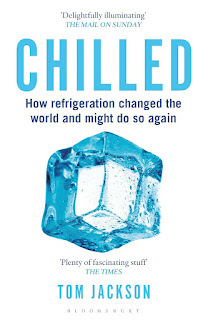 REVISIT SERIES - An updated post from July 2015
REVISIT SERIES - An updated post from July 2015I've recently had a very mild case of being trolled when someone moaned about a review I wrote of a book called Chilled.
Before anyone thinks I got too horrible in my opinion, I ought to point out that I gave the book four stars, was very positive about it and the publisher gave every evidence of being highly pleased with the review. But someone wasn't (and certainly wasn't chilled), as I received this tweet:

If this sounds rather confusing, I had said in my review:
There are comments on both the front and back covers by Tony Hawks. Now, my first inclination was to wonder what a pro skateboarder had to do with the science of cooling. But it turns out that this is Tony Hawks the comedian and raconteur. Ah, well, it's obvious what his connection is. Well, no, it isn't. Apparently he did a TV show and/or book where he went round Ireland with a fridge, and this is the only reason for having him along to give the book a puff. It seems, to say the least, a little tenuous.
 Incidentally, I know the pro skateboarder is Tony Hawk, not Tony Hawks, but in my defence, I once briefly reviewed computer games for a living, and one was called Tony Hawk's Pro Skater or some such, so I've always considered it fair game to appear to get them confused. I thought it was, to quote, 'rather a good joke', and I was sorry it wasn't for my critic. (If you are wondering where the quote is in the cover shot above, it was removed from the paperback. The original is alongside.)
Incidentally, I know the pro skateboarder is Tony Hawk, not Tony Hawks, but in my defence, I once briefly reviewed computer games for a living, and one was called Tony Hawk's Pro Skater or some such, so I've always considered it fair game to appear to get them confused. I thought it was, to quote, 'rather a good joke', and I was sorry it wasn't for my critic. (If you are wondering where the quote is in the cover shot above, it was removed from the paperback. The original is alongside.)I thought I'd explain a bit more. And we got into a 'discussion' about whether or not you have the right to say what you want on a review site. The final riposte from my critic was that the freedom of the internet also allowed him to comment on 'unfair criticism like this.' And this is what got me thinking about what makes for a fair review. Was what I had written unfair criticism? Really? If I had said something about the book that wasn't true, yes, it would have been unfair. But I honestly don't think the review was unfair - nor was there anything non-factual about my comment (okay, apart from the joke about Tony Hawk).
In the end it comes back to the reality that reviewing is a subjective art - it is a published opinion, not a scientific measurable fact. The review, including the (brief) moan about the puff on the jacket was my opinion. If someone doesn't like it, that's fine. Perhaps they should set up their own review site. But there really is no point arguing with a review simply because someone else doesn't have the same viewpoint.
These articles will always be free - but if you'd like to support my online work, consider buying a virtual coffee or taking out a membership: See all Brian's online articles or subscribe to a weekly email free here
July 24, 2025
Goldilocks driver assistance
 One of the interesting things about moving from an ancient car to a recent model is the availability of mechanisms to help the driver. At the extreme level, such as claimed by Tesla, this goes all the way to driving for you (occasionally into things you don't want to drive into). My car doesn't go that far, but for me provides three levels that give me what feels, for the moment, to provide the Goldilocks ideal of not too intrusive, not too feeble, but just right.
One of the interesting things about moving from an ancient car to a recent model is the availability of mechanisms to help the driver. At the extreme level, such as claimed by Tesla, this goes all the way to driving for you (occasionally into things you don't want to drive into). My car doesn't go that far, but for me provides three levels that give me what feels, for the moment, to provide the Goldilocks ideal of not too intrusive, not too feeble, but just right.At the highest level, which I use on motorways and fast dual carriageways, it keeps me at my desired speed, slowing down if there's an obstacle in front, keeps me in lane and (when it's in the mood) will change lane when I indicate. The fascinating thing about this is that because the steering movements are very gentle it is almost impossible to detect that it is steering unless you take your hands off the wheel (at which point, the car fairly rapidly starts to complain). Steering is such an automatic thing for an experienced driver that you hardly notice that you aren't doing it when it involves gentle movements.
If you try to use the same feature on a typically twisty British A or B road, it doesn't work well. The problem is that this requires constantly making small adjustments to the steering to follow the frequently changing road direction. Manually, this is a smooth operation, but the software makes it feel a touch jerky. (I have no idea if fully self-driving cars have the same problem as they rarely seem to be tested on British back roads, but I suspect they will.) More importantly, it can't avoid potholes! What is useful, though, if there are vehicles in front going slower than you want to on such roads (as there often are), is to engage the second level of automation, adaptive cruise control. This doesn't steer, but matches your speed to the vehicle in front.
For back roads without obstacles, or built-up areas, more often than not full manual control seems to be best. Although the adaptive cruise control will slow for some obstacles like sharp bends and roundabouts, it can't be relied on to keep you at a safe speed - and, frankly, it's more fun to go DIY on a truly open road.
I could be wrong, but for me this is just the right level of driver assistance. We'll see what the next car brings...
These articles will always be free - but if you'd like to support my online work, consider buying a virtual coffee or taking out a membership: See all Brian's online articles or subscribe to a weekly email free hereJuly 21, 2025
If a tree falls in a ditch does a celebrity chef hear it?
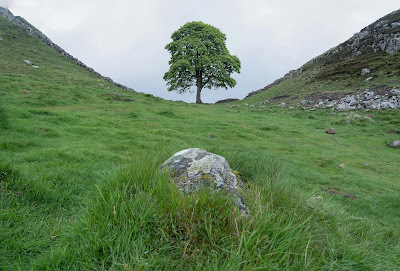 The question of whether a tree makes a sound if it falls in a forest with no one there to hear it is usually ascribed to the philosopher cleric Bishop George Berkeley, better known in mathematical circles for his attack on fluxions as 'the ghosts of departed quantities'. Apparently he never said it. But I was reminded of it on seeing one of BBC News' entertainingly bad headlines.
The question of whether a tree makes a sound if it falls in a forest with no one there to hear it is usually ascribed to the philosopher cleric Bishop George Berkeley, better known in mathematical circles for his attack on fluxions as 'the ghosts of departed quantities'. Apparently he never said it. But I was reminded of it on seeing one of BBC News' entertainingly bad headlines.It read: 'It felt personal': Si King on avoiding Sycamore Gap tree felling site until now
For those not familiar with his work, King was one half of The Hairy Bikers, a likeable pair of TV chefs. We are told of King's visit to the site as if it were the location of a massacre: 'He takes several deep breaths, steeling himself, then walks slowly up to the stump.'
In case you have somehow missed the story, in 2023 a pair of idiots cut down an attractive tree that nestled in a wide ditch alongside Hadrian's Wall near Haltwhistle. It had endless news coverage, first of the vandalism itself, and then of the subsequent trial and conviction of those accused of cutting it down. (At which, incidentally, they were given sentences of four years and three months, which seems suspiciously harsh, given significantly shorter sentences handed out for
worse crimes of GBH, sexual assault and more.)
There is no doubt it was a pretty tree in a nice location. But there are estimated to be around 3 billion trees in the UK. Sycamores are not rare or endangered. It's a shame it was cut down - but I can neither understand why it was in the headlines for so long, nor why people get so emotional about it. I love trees. Cutting it down made the view less pleasant. But so does every bit of graffiti I see from the train, for example. The media need to get a better sense of proportion. This kind of excessive coverage is simply not justified.
Image (the actual Sycamore Gap tree before felling) from Unsplash+ by Jonny Gios.
These articles will always be free - but if you'd like to support my online work, consider buying a virtual coffee or taking out a membership: See all Brian's online articles or subscribe to a weekly email free here



